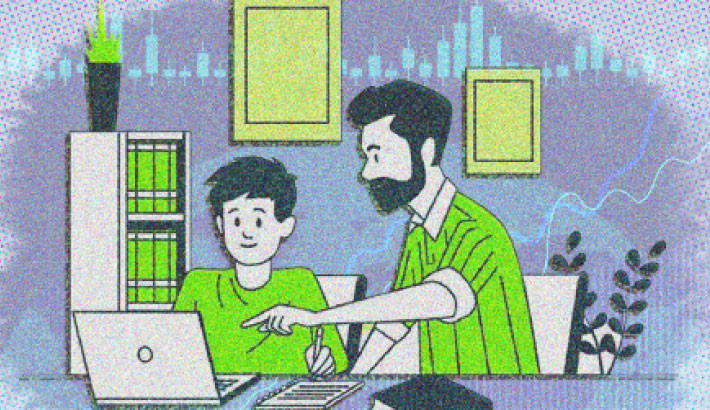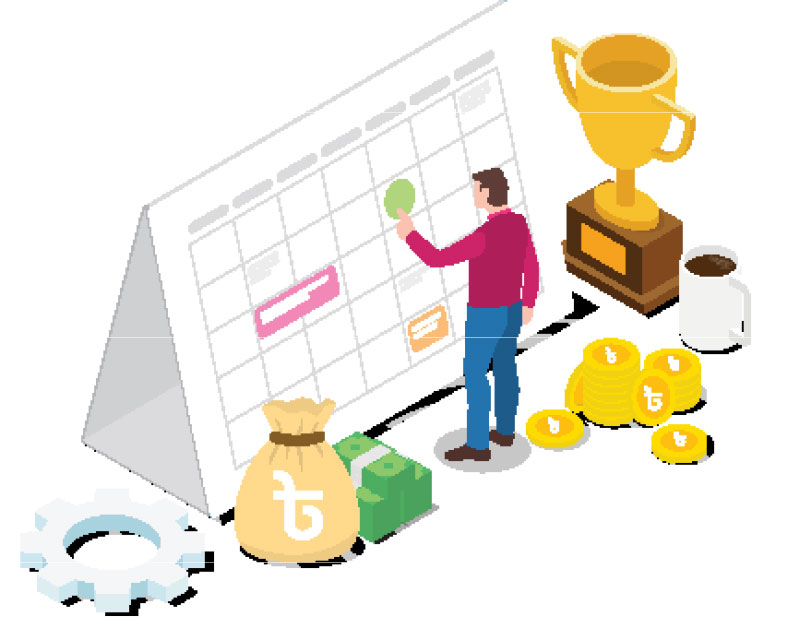How strategic saving can build generational wealth
Daily Sun Feature
Published: 27 Feb 2025

Wealth building might seem like a far-off dream for many in Bangladesh, where financial insecurity often lingers for millions, particularly in rural areas. However, strategic saving, when done right, can help change the narrative for individuals and families over time, creating the foundation for generational wealth. In a country where the majority of people still rely on informal financial systems or live paycheck to paycheck, saving and investing strategically can set the stage for long-term financial success.
So, how does one get started? Let’s take a closer look at how the path to wealth is being carved out by those who are focusing on smart savings and long-term strategies.
Start with financial literacy
In Bangladesh, many individuals lack basic financial literacy, which is a barrier to building wealth. For instance, according to a study by the Bangladesh Bank, a significant percentage of the population doesn't fully understand the concepts of compound interest, asset allocation, or risk management. In this context, improving financial literacy is essential. Educational initiatives from organisations like BRAC and Grameen Bank have made significant strides in educating people about the basics of savings, budgeting, and managing money.
Financial literacy doesn’t just empower individuals—it’s an essential tool for building generational wealth. When families understand how to save, invest, and plan for the future, they lay the groundwork for future generations to thrive financially.

Utilising the power of savings schemes
In a country where access to formal banking is limited for many, especially in rural areas, government-backed savings schemes have become a game-changer. The Bangladesh Post Office offers savings schemes with attractive interest rates, such as the Post Office Monthly Income Scheme, which appeals to many who are hesitant to invest in the stock market or riskier ventures.
Additionally, microfinance institutions like BRAC, ASA, and Grameen Bank have been instrumental in providing accessible savings opportunities. These organisations help people save small amounts regularly, building financial stability over time. The power of saving small amounts consistently cannot be overstated.
Investing in real estate: A time-tested strategy
Real estate in Bangladesh has proven to be one of the most reliable ways of building wealth. With the country’s growing urbanisation, the demand for land and property continues to increase. In cities like Dhaka and Chattogram, real estate investments have historically yielded substantial returns.
However, for rural investors, investing in land in areas with potential for future urban expansion can also provide long-term benefits. Land in up-and-coming areas is likely to appreciate as infrastructure projects, such as new roads, bridges, and residential developments, transform the landscape.
Real estate investments allow families to create a physical asset that can be passed down to future generations, ensuring their continued financial security. The key to success in real estate, however, lies in careful planning and market research to avoid risky ventures.
Education: The best investment for future generations
Bangladesh’s education system is improving, but significant challenges remain. Still, access to education is one of the best ways to break the cycle of poverty and build long-term wealth. By saving for their children’s education, parents in Bangladesh can provide them with opportunities for better-paying jobs and a more secure future.
Many families are already putting aside money for their children’s education, realising that the long-term benefits outweigh the immediate cost. A university degree, particularly in high-demand fields like engineering, medicine, or IT, can be a pathway to greater financial independence.
Entrepreneurship as a wealth-building tool
Entrepreneurship is a powerful wealth-building tool in Bangladesh. Small businesses, particularly in rural areas, can generate significant income. Many families have built their wealth through agricultural ventures, trading, or local manufacturing.
However, in today’s competitive landscape, it’s crucial for entrepreneurs to adapt and modernise. E-commerce, small-scale manufacturing, and tech start-ups offer enormous potential. With more access to digital platforms and mobile payment systems, like bKash, entrepreneurs can reach wider markets and scale their businesses in ways that were once unimaginable.
Insurance and estate planning
While still underutilised, life insurance is a crucial tool in Bangladesh for protecting wealth and ensuring a smooth transition to future generations. By securing life insurance, you can protect your family from unforeseen expenses, including funeral costs and outstanding debts.
Furthermore, estate planning is critical to ensuring your wealth doesn’t get eroded by taxation or familial disputes. Having a will in place and consulting with a lawyer about how to pass on assets will help preserve your legacy for future generations.
Generational knowledge and responsibility
As wealth is passed down, it’s important that future generations are educated on how to manage it. Parents in Bangladesh who successfully build wealth must take the time to educate their children about the importance of savings, investments, and financial planning.
The impact of this education is clear—families that pass down financial knowledge, not just assets, are more likely to see their wealth grow over generations.
Building generational wealth in Bangladesh isn’t a pipe dream. It’s achievable with strategic saving, prudent investments, and careful planning. By focusing on long-term financial goals and educating future generations, individuals can ensure that their financial legacy lasts for generations to come.

